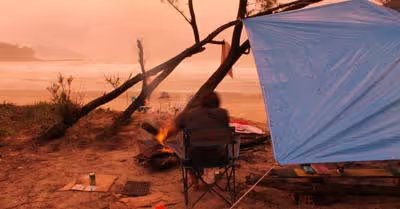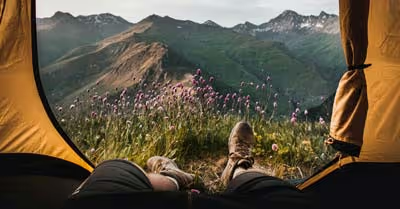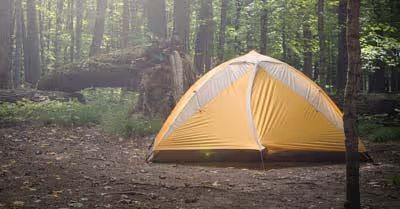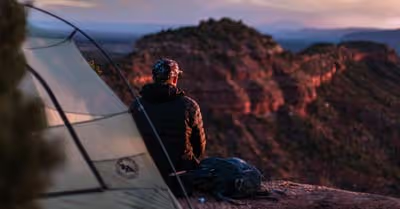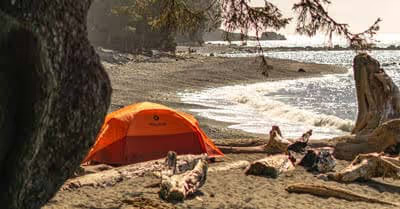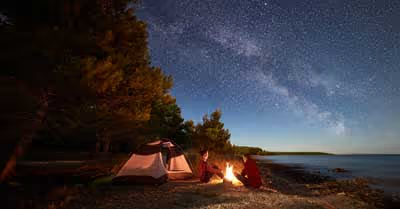Table of Contents
Why does my tent get wet inside?
The first reason why your tent gets wet inside is condensation, and the easiest way to prevent condensation is to make sure there is enough airflow. A good tent should have a window that you can open to allow air but not insects through.
Ventilation is usually enough. If there is airflow, the air will not get moist over time because of your breathing, and there will not be enough water in the air to cause condensation.
The first thing to remember is that a tent needs to have a window and that you need to open it. Everything else is secondary to that.
How a rain cover can prevent ventilation
Any tent, whether it has windows or not, will allow for some airflow. If you put the rain cover on a small tent without a window, most of what little ventilation there was will be cut off. If rain during the night seems highly unlikely, you might not put the cover on at all.
If it is going to rain, you have to use the rain cover, of course. Don't just throw the rain cover over your tent. Make sure to set it up the right way.
If you do not set up the rain cover properly, then it will prevent ventilation. If you set it up the right way, there will be some room for air to get through, and a bit of ventilation will occur. Simply getting a bigger tent can solve some of your problems with condensation.
Electric heaters are better than gas heaters
Another trick that may solve your condensation problems on its own is switching to an electric heater. Electric heaters do not produce moisture. Instead, they dry out the air around them and can help to prevent condensation.
Gas heaters, on the other hand, are terrible. Most gas heaters make the air moist faster than breathing does and will get your tent wet. Sometimes a gas heater that produces relatively little moisture is fine, but I always bring an electric heater instead.
Do fans work to ventilate the air?
Fans are another thing to try if you are still having trouble keeping your tent dry. Fans are not always large, cumbersome things that require power outlets. You can get a fan that is smaller and runs on batteries for the sake of keeping your tent dry and cool.
The best type of camping fans do not sit on the ground; instead, you hang them from the roof of your tent. A fan that is suspended in the air can move moist air around everywhere in a tent, even if the fan is small. Camping fans do work, but your first choice is a bigger tent with windows or an electric heater.
Cooking in your tent is not a good idea
Don't even cook something as small as a bowl of soup in your tent. Even a small meal will put enough water vapor into the air that your tent will get wet later on. Any water vapor from cooking will be in addition to any moisture from breathing plus moisture already in the air.
Don't bring wet clothes into your tent
If you come back to your tent with wet clothing on, make sure to avoid bringing water into your tent. When you sleep, make sure your clothes are very dry, preferably clothes that you only wear when sleeping and not while out during the day. Don't let any water from shoes or socks get into the tent.
How can you prevent your tent floor from getting wet?
This might seem to be a separate problem, but condensation is usually the cause of water on the floor as well. If you set your tent up on a platform, you are more likely to end up with water on the floor. The platforms your campsite might provide should be used, but they might lead to more condensation.
The wind can move freely under your tent if it is on a camping platform. Cold air moving under your tent leads to condensation. You can place plastic wrap (or even just dirt) around your tent to prevent airflow.
While placing your tent on the grass can help you get a good night's sleep, grass can also hide a lot of moisture that can soak through your tent. Placing your tent on dirt that is free of rocks and roots rather than on grass is ideal. If your cots or sleeping pads are good enough, you won't need the extra cushion that the grass provides.
Get a tent footprint
If your tent floor is getting wet even though your tent is not on a platform, a tent footprint might help you. A tent footprint is a simple pad that you put under your tent, which keeps it away from any moisture on the ground.
If you use a tarp as a tent footprint, don't spread it out too widely, as the water will collect on the tarp and get your tent wet if it rains.
Try a cot rather than a sleeping pad
With a cot, you can sleep above rather than on the ground. With a cot, you might be fine even if the tent has a somewhat wet floor.
Even with a cot, the ground should not be allowed to get wetter over time. Clean the water off of the floor and the walls each morning with a cloth. Don't take your time, just quickly get rid of the worst of the water so that it doesn't build up.
Can condensation get your sleeping bag wet inside?
Yes, if the inside of your sleeping bag is wet for no apparent reason, then it is probably condensation. Don't breathe inside your sleeping bag. Keep your tent warm enough that you don't need your head inside the sleeping bag.
Single wall VS double-wall tents
If you use a single wall tent, you can ventilate it more easily than with a double-wall tent that has less airflow. Double-wall tents are good in colder weather, but if you only go camping in the summer, use a single wall tent instead.
Don't hang wet clothes in your tent
Bringing wet clothes inside your tent is a terrible idea. Always dry your clothes elsewhere, and don't even briefly bring wet clothes inside. Either the clothes will drip everywhere, or they will put too much moisture into the air.
Can I prevent the floor of the tent from getting wet in the snow?
Yes, you can keep your tent dry in winter, but you have to pay attention to things like not bringing any snow into your tent. Put a tarp under your tent to prevent water from getting through the tent's floor. Take off your shoes on the tarp, not in the tent.
Don't set your tent up too close to bodies of water
If you are camping while the snow is melting, don't set up your tent near a river or lake. Lakes and rivers often flood in the spring, and the water can reach your tent even if it is fairly far away. Set up your tent on higher ground and away from bodies of water.
Test your tent before you use it
You should test your tent in the rain at home before you take it camping, to make sure it works properly. If the tent is obviously poorly made and leaky, you should be able to return it. Even a well-made tent might leak a little (it may leak around the zippers), but only a little water should be getting through.
How can I dry my wet tent or sleeping bag?
Use the wind and the sun to dry out a damp sleeping bag. If you hang it up in the wind, it should be dry before the next night. Be very careful when using a heater to dry out a sleeping bag, as many people have caused fires in this way.
If your tent is wet, it also needs wind and sun to get dry. Open it up and let the wind and the sunlight inside it. Depending on how wet your tent is, it will usually be dry before the next night.
Recent Articles



